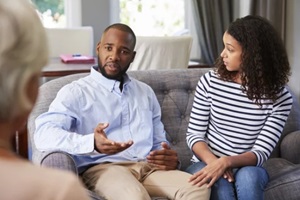
Despite how it may feel, conflict is not a sign of relationship failure—rather, it is an opportunity to learn more about yourself and the other person, growing together instead of apart.
To do this, many couples take advantage of couples therapy to help them identify problematic thought patterns and ineffective means of communication.
If your relationship is currently feeling stressful and you want guidance, or if it is new and you want to establish a great foundation, couples therapy can be a powerful way to work toward those goals as a team.
Here’s how couples counseling equips partners with the relationship strategies they need to navigate conflict of all shapes and sizes.
Understanding Conflict in Relationships
In a relationship, “conflict” usually refers to a disagreement. Some of the most common reasons that partners disagree are because they have differing opinions about how a situation should be approached, whether something is “good” or “bad,” or certain beliefs one person may have.
In many cases, conflict arises when one person behaves in a manner that the other person is surprised or upset by. When couples do not actively resolve their conflicts, they can foster resentment and contempt—emotions and behaviors that can quickly erode the solid foundations of a relationship.
By addressing conflicts directly, each partner can feel more understood, and the two can work together against the problem rather than each other.
Insights Gained from Couples Therapy
Couples counseling cannot force two disagreeing partners into alignment; that is the choice of each member of the couple. However, it can equip you with insights about how you and your partner behave and think. For instance:
Communication

Do you actively listen to your partner? Are you listening to understand what they are saying, or are you listening to respond?
When you frame your concerns, are you using “I” statements or “you” statements (e.g., “I feel that I do not matter to you when you choose to spend weekends with friends” versus “you never come home on the weekends!”)?
Underlying Emotions
Can you identify and name the emotions you are feeling when you speak with your partner? How do you try to empathize with and validate your partner? Are your emotions shaped by how your partner is feeling?
Patterns and Dynamics
Do you and your partner often struggle with the same issues, and is there a theme or common element among them?
Do you seek to stay in control during conflict, or does your partner dominate you? What kind of attachment style do you and your partner have, and is this causing conflict?
Strategies Learned in Couples Therapy
Once partners have spent time receiving active guidance with a couples therapist, they will become much better at identifying the underlying drivers of their conflict.
From there, they work in therapy to learn (and practice) the skills they need to address conflict in their daily lives. These include:
Conflict Resolution Skills
Good conflict resolution includes the ability to negotiate and compromise. Can you meet your partner in the middle? If an issue is not something that can be compromised on, finding win-win solutions is still the focus.
Trust Building
Transparency and honesty are the key elements of trust. These characteristics allow each partner to take at face value what the other person is saying, without fear of being deceived or tricked.
Conflict should be approached honestly and with emotional intimacy, allowing yourself to be vulnerable about how you feel and what your concerns are.
Setting Boundaries
Sometimes, conflict arises because one person has overstepped the other’s boundaries. Therapy can help each person to vocalize where their boundaries are, helping the other person to respect their individual needs and autonomy. Setting clear expectations can prevent many conflicts before they start.
Implementing Couples Therapy Strategies in Daily Life

Couples counseling serves as not only an educational opportunity but also a practice session for implementing conflict resolution strategies in your daily life.
It creates a safe and supportive space for practicing effective communication skills and addressing conflicts as they arise, rather than allowing them to intensify and become worse.
It is not the intention of a good therapist to keep you coming back to the office every week; good therapists want to equip you with the skills you need to succeed.
However, you should always seek support and revisit counseling when needed; sometimes, a quick refresher is all it takes to get back on track.
Navigate Conflicts Effectively with Couples Therapy
Conflict can feel uncomfortable, but it does not have to mean something negative for a relationship. With the help of couples counseling, partners can develop and implement skills and strategies to avoid large disagreements.
The team at Village Counseling wants to see you succeed and has helped many couples to improve their relationships. Contact Village Counseling to set up a couples therapy appointment.
